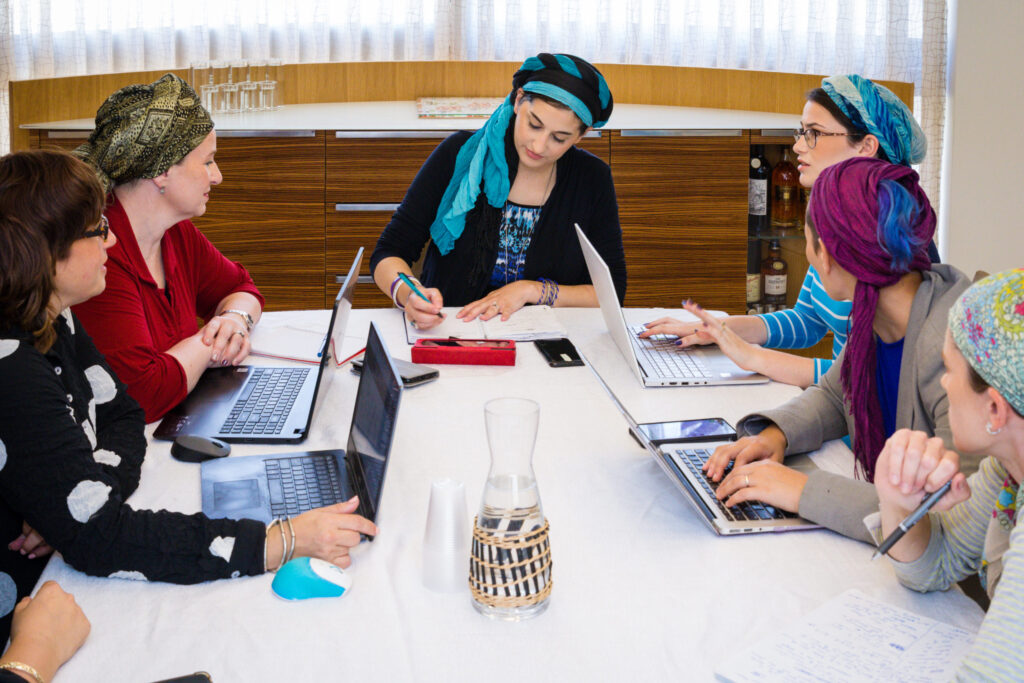At Monday’s Knesset debate on the Mikveh Bill, those in attendance were treated to mansplaining on an institutional level, some serious political games and, possibly, a bit of fraud.
Background
In Israel, what a woman does in the mikveh is not simply her own business. The Chief Rabbinate, religious councils and the balanit (mikveh attendant) are all involved. Women whose immersion practices and traditions are at odds with the dictates of the Rabbinate are often refused access to the publicly-funded mikvaot. In order to put a stop to this, a number of lawsuits have been filed with the Supreme Court in the past few years. Though successful in theory, the rules which establish women’s rights in the mikveh have not been put into practice. Thus, in a new suit, filed by the organization ITIM, 13 women are suing the Chief Rabbinate. The hearing is set for later this month.
Earlier this year, another Supreme Court case was filed – and won – about mikveh use. This case made it illegal to refuse the right to use state-funded mikvaot for Conservative and Reform conversions.
It was this case that led MK Moshe Gafni of United Torah Judaism to sponsor the so-called Mikveh Bill. The original writing of the bill states that “using a public purification mikveh, which is intended for immersion for purification or for conversion purposes, will only be permitted for halakhic immersion, conforming with the halakha (religious law) and with Jewish custom according to the Shulchan Aruch (Code of Jewish law) and the rulings of the Chief Rabbinical Council in Israel.”
While Gafni claims that the law is simply to ‘safeguard Judaism’ and prevent non-Orthodox conversions in state mikvaot, the people who will be most affected by the bill are Orthodox and traditional Jewish women who use the mikveh monthly.
How so? Under this ruling, women may only use the mikveh according to the Chief Rabbinate’s interpretations of Jewish law and tradition. If a woman’s tradition or ruling by her rabbi are not in line with the rulings of the Chief Rabbinate, she can be denied use of the mikveh. For example, women are barred from immersing without an attendant (despite this being permitted by the Shulchan Aruch). The bill also bars single women, women preparing to ascend the Temple Mount and women who would like to immerse for whatever purposes that they may choose — for example, to renew themselves after trauma or to mark an occasion (see here for more).
The bill was signed by 11 male MKs from UTJ, Shas and HaBayit HaYehudi and one female MK: Shuli Moalem of Bayit Yehudi. From the beginning, however, Moalem made her support for the bill contingent on key changes to the bill’s wording that would protect the women who use mikvaot, allowing them to immerse according to their own traditions.
Monday, June 5, 2016
The debate was nearly over before it began. In attendance were: MKs Gafni, Eichler, Azulay, Moelem, Azaria, Lavie, Stern, Swid, Glick, and Paran. Also present were representatives of numerous organizations, as well as individual women for whom autonomy and privacy in the mikveh are vital. It was standing-room-only; nonetheless, many of the men in the room seemed bewildered as to why so many women were present for the discussion.
The discourse was truly shocking. The concerns of religious and traditional women, whom the religious parties claim to protect, were dismissed completely out of hand.
The Play-by-Play
Because Gafni had not disclosed changes he had made to the bill, Moelem insisted on tabling the discussion.

MKs Rachel Azaria and Aliza Lavie, as well as Elazar Stern echoed Moelem’s demand. Gafni responded: “I never imagined that the wording of the law would be so important that anyone would need to read it first!”
Committee chair of the debate MK Amsallem of Likud, together with MKs from UTJ and Shas, insisted that the debate go forward, but the women MKs were having none of it. They vociferously opposed the bill for being harmful to women.
MK (Yesh Atid) Aliza Lavie pointed out that instead of promoting religious observance, this bill will actually result in violations of religious practice as long as the religious institutions continue to dismiss women’s concerns about the mikveh.

Rachel Azaria (Kulanu), furiously argued that it was unacceptable to reject the legitimate concerns and experiences of women in the mikva when women are the ones who are most affected and who have so much at stake if this bill is passed. She shouted over their interruptions and protestations that they were stripping women of their rights and traditions without hearing women out. Her passionate outburst resulted in her forcible removal from the room.
Throughout these exchanges, Gafni kept repeating his claim that women have nothing to worry about. But his claim that “this law doesn’t affect women at all!” is disingenuous, given that, as a man in the ultra-Orthodox community, he knows full well that married women immerse in the mikveh regularly. How could he claim women would not be affected by the changes his bill makes to the most intimate and feminine space in Judaism?

Indeed, his statement is laughable. To suggest that a law governing use of the mikveh won’t affect women is preposterous. Even to suggest, as he has done, that the bill does nothing more than establish the status quo is problematic; as Moalem pointed out, the status quo isn’t enough. That’s why women have been bringing suits for some time! Moreover, Gafni and several of the other male MKs present appeared to willfully ignore the implications of the bill that the female MKs were very loudly explaining to them.
When after an hour, the actual text of the revised bill was produced for the other MKs, it was immediately clear that the wording had been dramatically altered from the previous version and that Gafni had tried to hide it. MK Michal Rozen (Meretz) left no room for doubt: “I’m looking at both versions of the bill, the old and the new. This is not a revision of the the bill. These are two different bills.”

The legal advisor began reading the new bill aloud and the objections began in earnest. In response, Gafni screamed that it was not the legal advisor’s place to comment on the legality of the bill. He rose from his seat and yelled that it was “none of your business,” and that he was interfering with coalition agreements of which this bill is a part. Then he stormed out.
With Gafni gone and the clock ticking, MK Amsallem finally allowed four non-MKs to speak and learned a bit about what is at stake beyond a coalition agreement — and on whose (naked) backs this legislation tramples.
The first of these four, Keren Hadad Taub of Advot,, explained that most of the people affected by this bill are women, not only because it is women who use the mikveh regularly, but because the overwhelming majority of converts in Israel are female. The male MKs’ were surprised to learn this critical piece of information, the knowledge of which is vital to knowing how the bill will play out in practice. There is no way one can understand the real life implications of a bill without knowing who the bill affects.

“I hope you sleep well at night knowing that women have stopped going to the mikveh because of you,” saidfounder of T’nu Litbol Be-Sheket (LINK), a movement advocating for women’s rights in the mikveh, and secretary general of Yerushalmim party.
Rivka Shimon of Women for the Mikdash also pointed that, “this [bill] prevents women — married and single — from going up to Har Habayit.”
MK Amsallem interrupted her: “Wait, you’re saying that if a single woman shows up to the mikveh to immerse, they will tell her no?” The frustration in the room was palpable as the women answered with an exasperated “YES!”
The Core Issue
Amsallem was one of few male MKs in the room to pay attention to the implications of the bill (newest MK Glick and MK Stern did as well), and that is the crux of the issue. The bill will affect those who use the mikvah most, and not the Conservative and Reform conversions it’s purportedly designed to deter. But the Charedi parties that wrote the bill – for whom Torah observance should be of paramount importance – turn a blind eye to the pleading of the women to be heard and considered. Could it be that they simply do not care? Shouldn’t that be unthinkable? Yet when a high ranking charedi official in the the religious council of Jerusalem was told that, because of this bill, women won’t use the mikveh, he shrugged. “So, they won’t use the mikveh.”
This bill is supposedly about preserving Judaism, safeguarding the Torah, and the Jewish people. But it is not; it does none of those things. Rather, the bill is about power and control — about a coalition deal. The fact that it may result in the suffering of religious and traditional women, who by their very actions are preserving Judaism and safeguarding both Torah and the Jewish people, is of no concern. The women’s suffering and discomfort, the dismissal of their needs is simply collateral damage in the Charedi MKs’ service of a larger cause — their own political clout.


